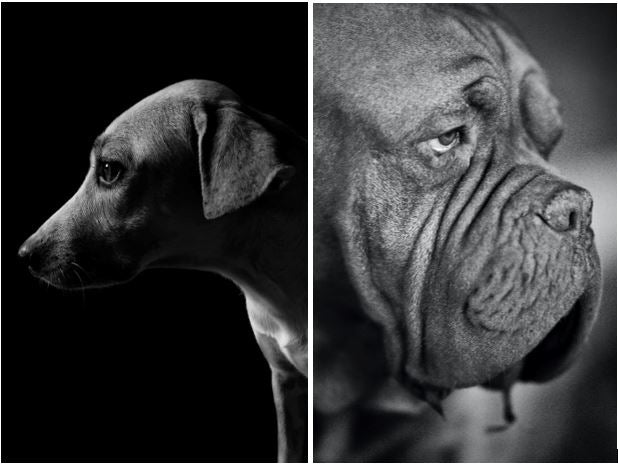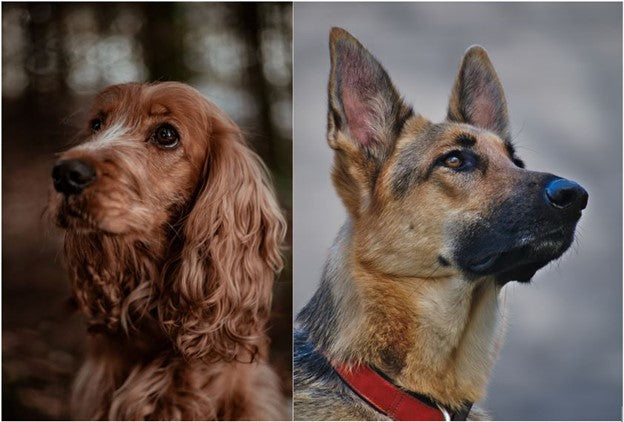Do you know the difference between a long-nosed and short-nosed dog breed (aside from the obvious of course)? Many people do not realize that there is a distinction, but there is! So, whether you are thinking about getting a dog or are simply curious about this topic, keep reading!
Long-Nosed Dog Breeds
The first thing you need to know about long-nosed dogs is that they were not only bred for herding livestock and guarding property, but also often bred for their tracking and hunting abilities as their noses can pick up scents much better than shorter nosed dogs.
There are specialized cells inside a dog’s nose that help them detect smells and dogs with longer noses actually have more of these than those with shorter faces. Which is the primary reason that they are not as good at tracking scents as their long-nosed brethren. Also, these dogs’ noses also help them to regulate their body temperature better in hot climates making it easier for them to put those noses to work in any situation.
Some examples of long-nosed dog breeds include:
- Bloodhounds
- Retrievers
- German Shepherds
- Beagles
- Dachshunds
- Pointers
- Whippets
Potential Health Concerns in Long Nose Dogs
The most common health concern in long nose dogs is allergies. Allergies can be caused by a variety of things, including food, environmental irritants, and even certain medications.
Dogs with long noses are also susceptible to certain diseases such as a fungal infection of the lungs, Aspergillosis. The best way to prevent your dog from breathing in born mold spores is to keep all food dishes clean and avoid your pet being around poor air conditions like when gardening with damp soil.
Another issue to be aware of is Kennel Cough which is a respiratory infection. You can often prevent this condition by keeping your dog away from other dogs that are sick and to get them vaccinated. If you think your dog has either of these diseases, please take them to the vet immediately.
Additionally, there are benign nasal tumors and nasal cancers which are less prevalent but serious in nature and long-nose dog owners should be aware of these as well.
Short-Nosed Dog Breeds
These dogs are referred to as Brachycephalic dogs, which means “short-headed.” These dogs have broad heads, shortened snouts, and often appear flat-faced. Short-nosed breeds were also originally bred for hunting purposes. Their smaller size made them ideal for chasing down smaller prey in tight spaces.
Brachycephalic dog breeds include:
- English and French bulldogs
- Bullmastiffs
- Boston terriers
- Boxers
- Pugs
- Shih Tzus
Potential Health Concerns in Short-Nose Dogs
Short nose dogs, also known as brachycephalic breeds, are prone to a number of health issues due to their unique physical characteristics.
Brachycephalic airway syndrome is a condition that affects short nose dogs who cannot breathe properly due to the shape of their head and face. Signs of this condition include snoring, loud breathing, exercise intolerance, and sleep apnea. If not treated, brachycephalic airway syndrome can lead to heart problems and respiratory failure.
Another concern for short nose dogs is their inability to regulate body temps. Because they have trouble cooling themselves down, it is important to keep an eye on them during hot weather and make sure they have access to plenty of water.
Finally, short nose dogs are also more prone to dental problems due to their crowded teeth. This can lead to gum disease and other oral health issues if not properly cared for.
Which Dog is Right for You?
So, what does this mean for dog owners? Well, it’s important to be aware of the health conditions associated with both long and short nose dogs.
Additionally, all dog owners should ensure that their pet gets regular checkups from the vet and follows a healthy diet like Health Extension Dog Food, and exercise routine. By being proactive about your pet’s health, you can help them live a longer and healthier life.
Have you ever owned a long or short nose dog? What was your experience like? Let us know in the comments.





